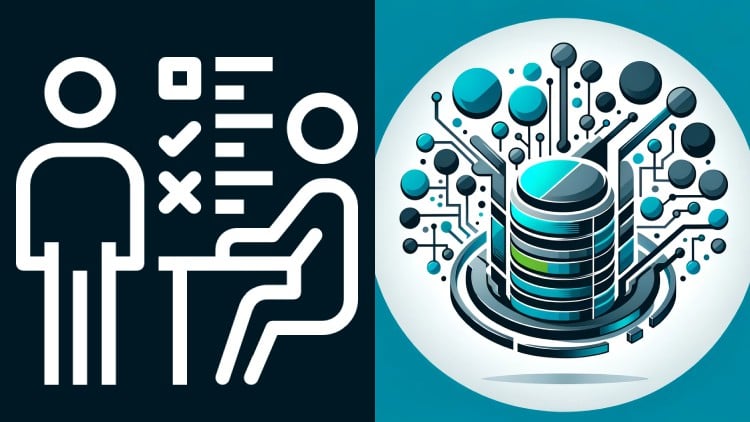
DBMS Interview Questions and Answers Preparation Practice Test | Freshers to Experienced | Detailed Explanations
⭐ 4.00/5 rating
👥 1,050 students
Add-On Information:
Note➛ Make sure your 𝐔𝐝𝐞𝐦𝐲 cart has only this course you're going to enroll it now, Remove all other courses from the 𝐔𝐝𝐞𝐦𝐲 cart before Enrolling!
- Course Overview
- This comprehensive practice test suite, “300+ DBMS Interview Questions Practice Test,” is meticulously designed to equip aspiring database professionals with the knowledge and confidence required to excel in technical interviews.
- Drawing upon a vast repository of common and challenging questions, the course simulates real-world interview scenarios, preparing candidates from freshers to experienced professionals.
- Beyond simply providing answers, it delves into “Detailed Explanations” for each question, elucidating the underlying concepts, best practices, and alternative solutions.
- The primary objective is to solidify your understanding of core Database Management System principles, SQL intricacies, and advanced database concepts through an interactive question-and-answer format.
- It aims to bridge theoretical knowledge with practical interview application, helping you articulate complex technical ideas clearly and concisely.
- Rated 4.00/5 by over 1,050 students, this course is a proven pathway to mastering DBMS interview challenges, fostering critical thinking, and refining problem-solving abilities within a database context.
- Embark on this practice journey to transform your conceptual understanding into interview-ready expertise, covering everything from fundamental ACID properties to advanced query optimization.
- Requirements / Prerequisites
- A foundational understanding of basic database concepts, including tables, columns, rows, primary keys, and foreign keys.
- Familiarity with standard SQL syntax for data definition (DDL), data manipulation (DML), and basic querying (SELECT, INSERT, UPDATE, DELETE).
- Prior exposure to the purpose and function of at least one relational database management system (e.g., MySQL, PostgreSQL, Oracle, SQL Server) is beneficial but not strictly mandatory for conceptual understanding.
- A working knowledge of data normalization forms (1NF, 2NF, 3NF) will aid in comprehending database design questions.
- No specific software installation is required as the course operates purely as a practice test platform accessible via a standard web browser.
- An earnest desire to deepen your DBMS knowledge and rigorously prepare for technical interviews.
- Basic computer literacy and reliable internet access are essential for engaging with the online test material.
- While not a strict prerequisite, a basic grasp of data structures and algorithms can provide a richer context for understanding database indexing and performance concepts.
- Skills Covered / Tools Used
- Core Database Concepts: In-depth understanding and articulation of ACID properties, transaction management, concurrency control mechanisms (locking, deadlocks), and database recovery techniques.
- Relational Database Design: Mastery of normalization forms (including BCNF and 4NF/5NF conceptual understanding), denormalization strategies, Entity-Relationship (ER) modeling, and schema design best practices for various scenarios.
- Advanced SQL: Proficiency in complex queries involving various types of joins, subqueries, Common Table Expressions (CTEs), window functions, aggregate functions, and the practical application of DDL/DML/DCL/TCL commands.
- Indexing Strategies: Comprehensive knowledge of different index types (B-tree, hash, clustered, non-clustered), their implementation, advantages, disadvantages, and impact on query performance.
- Database Performance Tuning: Techniques for identifying and resolving query bottlenecks, interpreting execution plans (EXPLAIN), optimizing schema design, and enhancing overall database efficiency.
- Stored Procedures, Functions, Triggers, and Views: Understanding their creation, usage, and implications for application logic, security, and performance.
- Database Security & Administration: Concepts related to user management, roles, privileges, authentication, authorization, and basic backup/recovery principles.
- Advanced Topics: Exposure to concepts like distributed databases, data warehousing fundamentals (OLTP vs. OLAP), NoSQL database paradigms (at a conceptual comparison level), and database scalability challenges.
- Interview Communication: Indirectly, the course hones your ability to structure technical answers, explain complex topics lucidly, and defend design choices, which are crucial soft skills for any interview.
- Tools Used: The primary “tool” is the interactive online practice test environment itself, which serves as the medium for delivering questions and detailed explanations.
- Benefits / Outcomes
- Gain unparalleled confidence in approaching and successfully navigating DBMS-focused technical interviews, irrespective of your experience level.
- Develop a robust and comprehensive understanding of fundamental to advanced DBMS concepts, moving beyond rote memorization to true conceptual mastery.
- Learn to articulate your technical knowledge clearly and concisely, effectively communicating your understanding to interviewers.
- Identify and address specific knowledge gaps through targeted practice and detailed explanations, transforming weaknesses into strengths.
- Master the art of problem-solving for database-centric challenges, including query optimization, schema design, and transaction management.
- Acquire strategic insights into common interview patterns, tricky questions, and best practices for answering scenario-based queries.
- Significantly enhance your chances of securing roles such as Database Developer, Database Administrator (DBA), Backend Developer, or Software Engineer requiring strong database skills.
- Elevate your understanding of how DBMS principles are applied in real-world systems, moving from theoretical knowledge to practical application.
- Benefit from a structured learning path that systematically covers over 300 crucial interview questions, ensuring thorough preparation.
- Reduce interview anxiety by being well-prepared and familiar with the types of questions you are likely to encounter.
- Accelerate your career progression by solidifying a critical skill set highly valued across the tech industry.
- PROS
- Extensive Question Bank: Offers a massive collection of 300+ unique and relevant interview questions.
- Detailed Explanations: Each question comes with in-depth explanations, facilitating genuine learning and concept reinforcement.
- Comprehensive Coverage: Spans a wide array of DBMS topics suitable for all experience levels, from freshers to experienced professionals.
- Interview-Focused: Specifically tailored to prepare candidates for technical interviews, increasing job readiness.
- Proven Effectiveness: High student rating and large enrollment numbers attest to its quality and utility.
- Self-Paced Learning: Provides flexibility, allowing users to practice and learn at their own convenience and pace.
- Confidence Building: Regular practice with realistic questions helps build self-assurance for actual interviews.
- CONS
- As a practice test, it inherently lacks hands-on project building or live coding exercises beyond the Q&A format.
Learning Tracks: English,Development,Database Design & Development
Found It Free? Share It Fast!